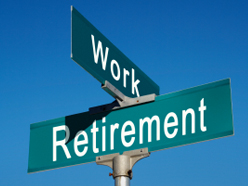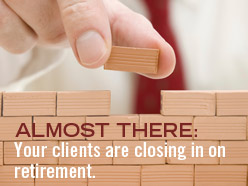Baby boomers who fail to implement a long-term financial plan early in their retirement years are at risk of having their government benefits and credits clawed back, warns the BMO Retirement Institute.

Once seen as a rarity, the idea of working during retirement has gone mainstream. A new survey by CIBC suggests that a substantial majority of Canadians—69%—plan to stay in the workforce in some capacity.

We frequently hear that Canadians are unsure how much to save for retirement. But a new study by Edward Jones reveals clients may be equally clueless about how much they can spend in retirement.

The average Canadian expects to retire debt-free at age 63, according to a new Harris/Decima poll commissioned by CIBC. However, the poll also shows that older Canadians are less optimistic about reaching their savings goals and expect to carry at least some debt into retirement.

A majority of Canadian boomers plan to spend their sunset years in Canada, according to BMO Retirement Institute Special Report.

The first Canadian baby boomers have hit official retirement age; soon their ranks will swell. Many advisors built their practices around accumulating wealth for these clients. Now comes the tricky part: planning for the actual retirement phase.
With risk rising again to the forefront of investors’ minds, it’s hard not to worry whether retirement assets are as safe as they could—and should—be.

Canadians fancy themselves as being debt-free in the next decade and are aggressively paying down debt, but a new study reveals they may be unrealistic about the age by which they expect to have paid their financial dues.
I think we can all agree that when it comes to retirement income planning it is better to be safe than sorry and it’s important to plan for the unknown as much as possible. It is the same reasoning most of us use when we get into our cars and do up our seat belts.

Retirees, like many other clients, can be emotional and extremely reactive to market shocks. how can their advisors prepare to handle frequent fluctuations in their mood and needs in such tumultuous times?